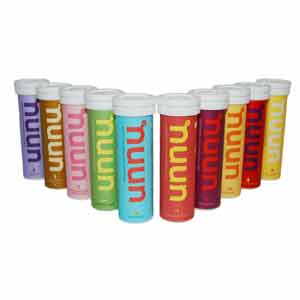
By Vishal Patel, Nuun Hydration Nutritionist
The New York City Marathon is usually a nice indication that fall is coming to an end, but as we shift gears into winter with athletes beginning their off-season programs it’s safe to say that many don’t stop training!
Should I hydrate less in the winter?
During the winter we hear a lot from our consumers that they tend to not drink as much water or Nuun as compared to summer months, and generally it’s due to the perception that we do not sweat as much when it’s colder. That theory may be true at times, however, many other factors come into play to determine how much fluid you need. For instance, winter air is cold and dry, that in turn will lead to an increase in thirst – a sign of dehydration.
Note: a mere 2% loss in body-water content has been noted to cause dehydration leading to a decrease in athletic performance.
But I feel like I sweat less in the winter!
Yes, in the winter it may seem as if you are not sweating as much. On top of dry air affecting your hydration status, the regulation of your internal body temperature (thermoregulation) has a tough time adjusting to the drastic changes.
The cold air triggers your body to try to reserve heat and maintain fluid balance by decreasing the release of heat (through sweat). But what we often forget is that runners tend to add layer upon layer of clothing to help keep the body warm. This increase of layers will cause your skin temperature to increase, which can lead to heat needing to be released (through sweat). So, in some instances we can actually sweat more due to winter layering and taking too drastic of an approach to stay warm.
Ways to balance the cold weather and your body temperature:
- Shed layers after a thorough warm-up
- Keep key areas covered and warm: your feet (this will be taken care of by the constant pounding), your ears (wear a hat or headband), and your hands (gloves!).
Hypothermia & Hydration
Hypothermia is a concern for athletes who partake in cold weather sports at high altitude. Mountain air is most difficult to breathe due to the very cold and very dry nature of air at altitude. But oftentimes the difficulty breathing is the result of a decrease in blood volume flowing freely through your heart and on to working muscles. Having proper fluid balance with electrolytes will help get blood to wear it needs to go, and help muscles function properly.
Air Humidity & Hydration
The last factor to take into account is the high levels of humidity in the mornings. The combination of cold, dry air, and more moisture in the air will increase the occurrence of dehydration. Knowing how much to drink is just as crucial as going into your workout adequately hydrated! The cardinal rule is to drink according to thirst, without exceeding 20 oz per hour. Also, it’s never a bad time to take a sweat test to determine your sweat loss.
Nuun’s Tips for Winter Hydration:
- Have a hydration plan – carry a belt or stash some bottles along your route.
- Be well hydrated prior to your activity – drink Nuun Active Hydration the night before/morning of your key workouts.
- Aim to drink 3-4 liters of water per day – drink Nuun All Day packed with all-natural vitamins and minerals!
- Be sure to include Nuun in your recovery regimen – have a glass of warm lemon tea post run. Bonus: caffeine has been known to enhance glycogen re-synthesis speeding up the recovery process
- As always pay attention to signs and symptoms of dehydration and inadequate fluid stores. Post-run headaches, muscle cramping, and fatigue are all signals that your body needs water and electrolytes!
Click for more Cold Weather Running Tips.
Latest News
Upcoming Events
Hoka & Fleet Feet Knox 4x4 Challenge
6:00pm - 8:30pm | FLEET FEET KNOXVILLE
FOR MORE INFO - https://runsignup.com/Race/TN/Knoxville/FleetFeetKnoxHokaXChallenge
Learn More ›Open Group Run
6:30pm - 7:30pm | Fleet Feet Knoxville, 11619 Parkside Dr, Knoxville, TN 37934
When: Every Thursday at 6:30pm Where: Starts from the store Who: All levels welcome Distanc…
Learn More ›
Connect With Us
See the latest from Fleet Feet Knoxville